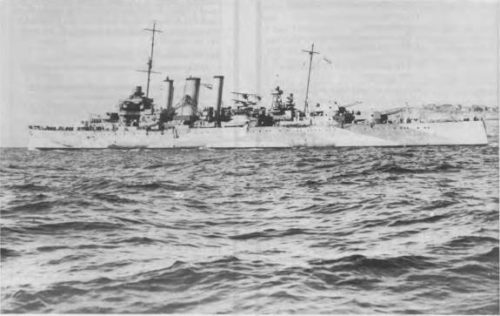- Author
- Zammitt, Alan
- Subjects
- Biographies and personal histories
- Tags
-
- RAN Ships
- HMAS Australia II
- Publication
- June 1989 edition of the Naval Historical Review (all rights reserved)
In 1945, Mr William McKell, the Premier of New South Wales (and later to become Sir William McKell, Governor-General of Australia) crossed the Atlantic in Australia when on a wartime tour of the USA and UK. Premier McKell was so impressed with Captain Armstrong he made a strong and particular recommendation to appoint the Captain as Governor of New South Wales after Lord Wakehurst’s term expired in 1936, and sent the following letter.
2nd October, 1945
The Hon. Sir Frederick Jordan, K.C.M.G.
Lieutenant-Governor,
Government House
SYDNEY
Dear Sir Frederick,
I have received your letter of the 25th September, 1945, setting out the terms of a secret and personal telegram dated London, 5th September, 1945, and received by you from Lord Addison, Secretary of State for Dominion Affairs, and submit to you the following reply.
“Secret and personal. I have read with much pleasure your telegram of 5th September, 1945, addressed to His Excellency the Lieutenant Governor of New South Wales.
At interviews with Lord Cranborne, which took place during my recent visit to London, I expressed fully my views in relation to the appointment of Governors for this State, and am gratified to learn that you have talked with him. I assume that he has conveyed to you the substance of my views and that there is no need to repeat them to you.
Your admirable summary of the qualifications which should attach to a candidate for appointment to this important office has my complete accord.
As you are no doubt aware, I mentioned to Lord Cranborne the names of several senior officers in the various branches of the Armed Forces of Australia who might be considered for the appointment which is to be made in the near future, and which is the subject of your telegram. After a careful and exhaustive review of the merits and qualifications of each of these officers, and having regard to the clear principle that the person appointed should be generally acceptable to all sections and parties in this State, I have great pleasure in recommending for your favourable consideration the name of Captain John Malet Armstrong.
Captain Armstrong has had a long and distinguished career in the Royal Australian Navy. You may recollect that he commanded His Majesty’s Australian ship Australia, when recently that ship visited the United States of America, and more lately, when it visited the British Isles. He is presently in the service of the Royal Navy.

During the early stages of the war in the Pacific, I held regular weekly conferences with leading representatives of the Australian Armed Forces. Captain Armstrong attended a number of these conferences in the capacity of Chief of Staff; I had therefore, a singular opportunity of observing him from time to time, and of forming an estimate of his character and ability, and I have no hesitation in assuring you that he is a gentleman of wide knowledge and experience, whose excellent address and marked capacity would ensure the maintenance of the traditions and dignity of the office of Governor of this State and the efficient and satisfactory discharge of the duties of that office.
He has had an extensive and varied experience in the field of official contact with the general public. In his capacity as Chief of Staff he delivered able addresses on behalf of the Commonwealth of Australia in its appeals for subscriptions for War Loans. His speech at an Australian rally held at Rockefeller Centre, New York, in support of a War Loan Appeal of the United States of America, created a distinctly favourable impression. And you will probably recall that his address on the occasion of the Lord Mayor’s Reception to the officers and crew of HMAS Australia held at the Guild Hall, London, recently, created wide public approbation.
These instances are cited merely as isolated examples in support of his qualifications in the matter of public relations with the community generally.
Captain Armstrong represents a family which has given conspicuous service to this State, with credit and distinction to itself and the Government, and with the admiration and approval of the public. His grandfather, the late Richard Ramsay Armstrong, was himself a Naval Commander; his father, the late William George Armstrong, MB, DPH, occupied for many years the offices of Senior Government Medical Officer and Director General of Public Health, his uncle, the late Judge Armstrong, was a distinguished and respected member of the bench of this State.




